Adapted from Coach K, by Ian O’Connor Copyright © 2022 by Ian O’Connor. Reprinted by permission of Mariner Books, an imprint of HarperCollins Publishers.
Mike Krzyzewski’s motivational techniques at Duke were never going to work with the NBA’s best at the Olympics. Elton Brand, his center with the Blue Devils in the late 1990s, remembers Coach K once challenging a Duke player to a fight. “I think he would have won,” Brand says. He means the coach, not the player.
Krzyzewski, a West Point man, verbally destroyed a procession of underperforming Blue Devils over the years. He once responded to back-to-back ACC road losses by shredding his players in the locker room at 4 a.m., after an all-night ride home from Virginia Tech. “You motherf------ don’t deserve to wear the Duke jersey,” he screamed before kicking them out.
He severely blistered point guard Jay Williams for not running a designed play in a loss, and for supposedly spending too much time thinking about his certain jump to the NBA. Williams shouted back and approached Coach K while punching a fist into his palm. One person who was in the room, Williams’s teammate Reggie Love, compares the tension and awkwardness of that moment to a 2007 argument he later witnessed between rival Democrat presidential candidates Barack Obama (for whom Love served as a personal aide) and Hillary Clinton.
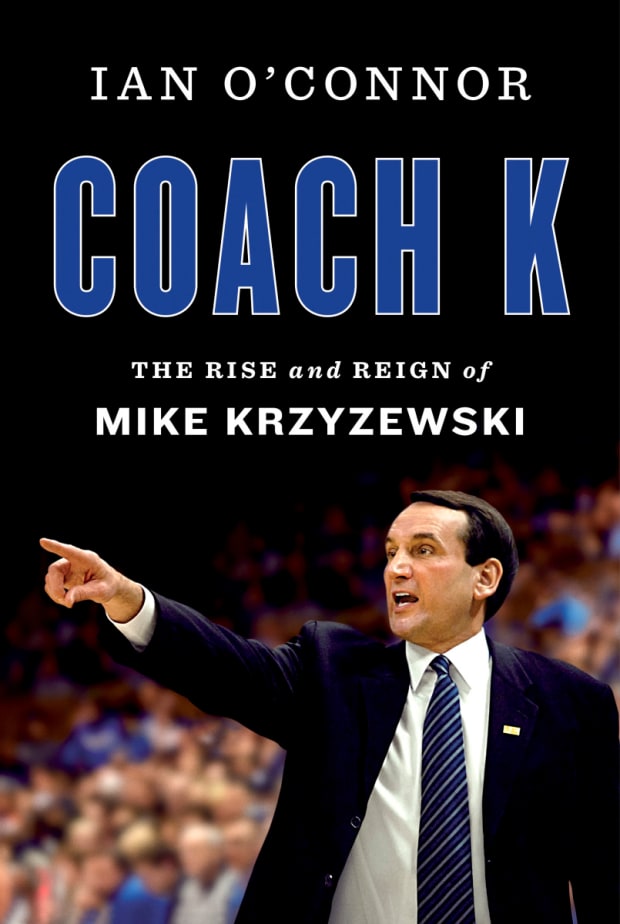
Buy Coach K: The Rise and Reign of Mike Krzyzewski
Then again, after Williams suffered his near-fatal, career-ending motorcycle accident in 2003, Krzyzewski was standing at his ex-player’s bedside when he woke up in the hospital. Williams’s agent, Bill Duffy, says he’d never seen a coach more involved in a player’s recovery and post-op medical care. “Like his own son,” Duffy recalls.
In the end, the Krzyzewski Way worked on the college level. “He’s the best handler of players, of getting them to buy in,” says Syracuse coach Jim Boeheim. “The best at the psychology of coaching.”
Or, to be exact, the psychology of major college coaching. In the lead-up to the Beijing Olympics of 2008, USA Basketball gambled that Krzyzewski wouldn’t try to pull his Duke stunts with the world’s greatest players. So much was at stake after program overlord Jerry Colangelo selected Coach K—instead of Spurs coach Gregg Popovich—to lead the U.S. out of the rubble of the ’04 Athens Olympics. Larry Brown’s team had been an on- and off-the-floor embarrassment and, according to one USA Basketball source, “[NBA commissioner David] Stern was like, ‘Why are we doing this? Let’s get out of the Olympics.’ ”
Krzyzewski was hired to overhaul the culture and win gold. His old archrival at North Carolina, Dean Smith, had endorsed him as the only college coach capable of pulling this off, yet many of the sport’s elders still thought it was crazy to pick him over a three-time NBA champ.
As he prepared Team USA—the Redeem Team, as it was known—Krzyzewski understood he was no longer in Durham. He knew he couldn’t expect his players to adapt to him. He had to adapt to them.
That was evident during an exhibition game against Lithuania, in Seoul, before the 2006 world championship tournament in Japan. Krzyzewski ripped into Magic center Dwight Howard, who had skipped college and had become the No. 1 pick in the ’04 draft, for the way he was (or wasn’t) defending the pick-and-roll. “It wasn’t personal,” says Shane Battier, who played for the coach at Duke and on that U.S. team in ’06. “But this is the way Coach K is. You could tell Dwight Howard was not used to having many people talk to him like this. The look on Dwight’s face was, Who the hell are you?
“Coach K has awareness, so he saw the look on Dwight’s face and immediately said to himself, Oh my gosh, I can’t do this. I can’t treat these guys this way. Dwight didn’t do what Coach K wanted in the second half because I think he was mad at him, but Coach K found a valuable lesson there. I can’t push buttons with these guys that work with Duke guys.”
So at the start of his Las Vegas training camp on July 20, 2008, Krzyzewski gave good thought to what buttons might work with his pros. Kobe Bryant had intended to play at Duke if he’d gone to college; later he’d wanted Krzyzewski to be his Lakers coach, and he’d maintained a good relationship with Coach K’s wife, Mickie. So people close to Team USA were not concerned about the Kobe–Coach K dynamic, especially after Bryant showed up in Las Vegas two days early, knocked on Krzyzewski’s door and asked to guard every opponent’s best perimeter player, promising to destroy them.
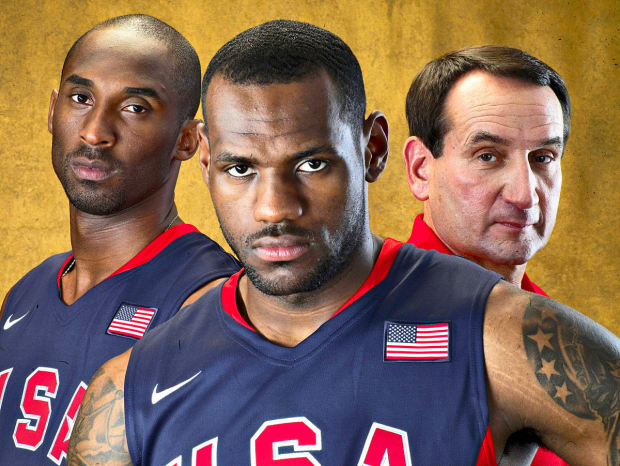
Michael O'Neill/Sports Illustrated
It was Krzyzewski’s relationship with LeBron James, who also had never played for a college coach, that people worried about. In Japan, James, Dwyane Wade and Carmelo Anthony had been rebuked by Coach K and Colangelo for wearing what Colangelo described as “strapped undershirts, with headphones on” in public, in violation of the U.S. team’s dress code. “LeBron said, ‘Man, we didn’t do things like that in Cleveland,’ ” Colangelo recalls. “I said, ‘I know that. You get everything you want.’ Wade said something like, ‘You don’t have to be that strict. We’re grown men.’ I said, ‘I’ll tell you what, we’ll do what Pat Riley does in Miami.’ The point was: We weren’t asking for much, and they had it much more difficult with NBA teams as far as rules.”
That tiff didn’t help the tension between LeBron and Coach K, nor did the fact that James had already lost a big international competition with Krzyzewski—Greece shocked the heavily favored U.S. in those 2006 world championship semis by running one pick-and-roll after another—just as he had lost one with Brown in Athens. Now, over two consecutive summers, Krzyzewski had traveled to Akron, Ohio, where James had been raised by a single mother, just to get to know the Cavaliers’ homegrown juggernaut.
They had stayed in touch—James called with congratulations after Krzyzewski earned his 800th career victory—and there were signs that the relationship was improving. But when training camp opened in Vegas, says one U.S. staffer, “there were guys who were still very skeptical of Coach K.” Battier (who would miss Beijing with an ankle injury) says he was “absolutely sure NBA players were skeptical of Coach K” in the early USA Basketball years, “especially the guys who didn’t play in college. . . . In the pros it’s different. Coaches are more X’s-and-O’s-based. There’s not a lot of personal development. You get along with your coach, yeah, maybe get a beer. But you don’t get taught life lessons from an NBA coach, and that’s Coach K’s biggest strength.”
Was LeBron James really going to embrace the same life lessons Krzyzewski handed down to 19-year-old college kids? James, then 23, was still finding his voice as a player, and, according to one Team USA source, “He didn’t always steer the team in the right direction. LeBron had to learn to be a killer. LeBron was a showman, and Kobe was an assassin.”
It went without saying that Coach K preferred assassins, or at least strong team leaders with a singular focus. Before the first meeting in Vegas, a Team USA official says Krzyzewski pulled James aside and told him, “I’m going to ask the players for their thoughts and feelings, and I need you to say a few words.”
“No problem,” James responded. “I’ve got you covered.”

John W. McDonough/Sports Illustrated
Coach K had similar individual chats with Bryant, Wade and Jason Kidd, and all three would go on to address the room as they sat behind tables in a classroom-like setting at the Wynn Las Vegas resort. Krzyzewski handed out folders that included a picture of the gold medal, an image of the Olympic bracket, an itinerary and a blank page titled standards. Jim Delany, the longtime Big Ten commissioner who served as a USA Basketball executive, calls what followed “the essence of leadership” and one of the more impressive team meetings he’d ever witnessed.
“Coach K said, ‘I want to go around this room and I want to hear from each one of you as to the standards to govern this group, and you guys are going to define the standards of what you’ll accomplish here. Once you establish the standards, I as the coach will make sure you live up to those standards,’ ” Delany recalls. “It was brilliant. . . . It was a simple, well-thought-out and respectful way to communicate with the best players in the world.
“A lot of people spoke from the heart. . . . Kobe said, ‘Coach, I’ll do anything you want. If you want me to take the last shot, I’ll do it. If you want me to guard the best player, I’ll do it.’ ”
Bryant spoke of playing defense and rebounding and doing all the grind-it-out things international players didn’t think the Americans ever wanted to do. Kidd, the ultimate distributor at the point, talked about respecting one another and the need to show up on time. Wade addressed how everyone needed to show full commitment to one another. Other players and coaches weighed in with their own thoughts—but about 45 minutes into the meeting, James still hadn’t said a word.
Krzyzewski later told confidants that he was getting nervous, afraid that LeBron was going to leave him hanging. According to one of those people, Coach K said, “We were close to ending the meeting, and this motherf----- didn’t speak up. I needed him to talk.”
One Krzyzewski associate in the room says it was clear that the coach was trying to extend the meeting simply to give James an opportunity to finally address his teammates. “Kobe was great,” that associate says, “and it was that period where Kobe was at the height of his powers. But . . . everybody in that room knew the best player in the league then and for the next decade was LeBron James. Everybody was waiting for LeBron to say something.
“He was leaning back in his chair, still this air left over from the first two summers. . . . He was reluctant. He knew the power he’d be extending Coach K. A great power struggle in sports was going on in that room.”
Another staffer in that meeting thinks LeBron was apprehensive about speaking because he hadn’t won a championship yet, in the NBA or in international competition. That staffer thinks James was afraid of saying the wrong thing with no trophies to back it up.
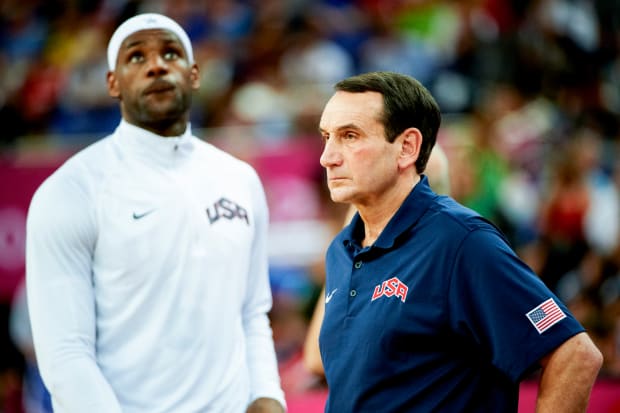
John Biever/Sports Illustrated
Coach K was running out of time and patience, and now he was searching for an exit ramp. He was wearing his 1992 Dream Team ring (he’d been an assistant on Chuck Daly’s staff), and he told his players he would never again wear it, that he wanted to replace it with a 2008 ring, which would represent a journey they’d remember for the rest of their lives. He was ready to give up on James and end the meeting.
“If we leave that room and LeBron hasn’t said anything,” the first associate says, “that’s not good. We waited and waited, and all of a sudden LeBron spoke. And he spoke eloquently, beautifully.”
The room turned quiet, and one coach present says that “everyone in the room exhaled when LeBron finally spoke. . . . LeBron was not very trusting of male figures and coaches, and Coach K just wore him down and established a trust. That meeting was so emotional and empowering that I think LeBron was like, ‘All right, I’ve got to plant my flag here.’ ”
James started talking about the U.S. needing to be “a no-excuse team.” He looked around the room, saw all the talent any basketball player could ask for and announced that a failure to win gold would be theirs and theirs alone. “How many times do we say, ‘I wish I had Chris Paul in the backcourt,’ or ‘I wish I had Dwight Howard with me,’ or ‘I wish I had Jason Kidd with me’?” he asked. “Well, guess what? I’ve got Dwight Howard. I’ve got Jason Kidd. . . . This is what we always wanted. There are no f------ excuses.”
It felt like a big moment, and Krzyzewski immediately sensed it. He had just scored his first victory with his 2008 team, and before officially ending the meeting, he needed only to add these two words: “Amen, brother.”
Krzyzewski was in a good place with his Olympic team entering its final exhibition game, against Australia in Shanghai. He had heard that Larry Brown rarely met with his players outside of the gym in Athens; Krzyzewski made sure he was in near-constant communication with his. He tried to make individual contact with four to six players before or after every practice, from 30 seconds to a few minutes, just to maintain a personal connection. He ran quick meetings with them in conference rooms before they boarded the bus to practice.
He did that, according to assistant Nate McMillan, because NBA stars are accustomed to slapping on their headphones and heading to the back of the bus to create space between themselves and the coaching staff. “Coach K wasn’t used to that,” McMillan says. So if Krzyzewski’s NBA players were going to enter and exit the bus through middle doors, to avoid passing the coaches seated in the front, these meetings ensured that he still got quality time with them.
Krzyzewski listened to his players if, for instance, they thought it was a bad idea on a particular day to practice twice, or if they wanted to focus on their individual NBA conditioning routines. “A spa day,” he called those occasions when he let them do their own thing. Coach K was concerned that players sometimes did stretching exercises when he was addressing the team, but his NBA assistants assured him that they were listening and that he shouldn’t feel slighted.
And yet, on one particular ride to a scheduled shootaround, coaches heard James complaining that he didn’t find the session necessary. There had already been a moment in practice when James turned his back on Krzyzewski as the coach was addressing him. Coach K would later reveal to interviewer Graham Bensinger that he firmly told LeBron, “Look at me. We need to have eye-to-eye contact.” Now James was griping audibly on the bus.
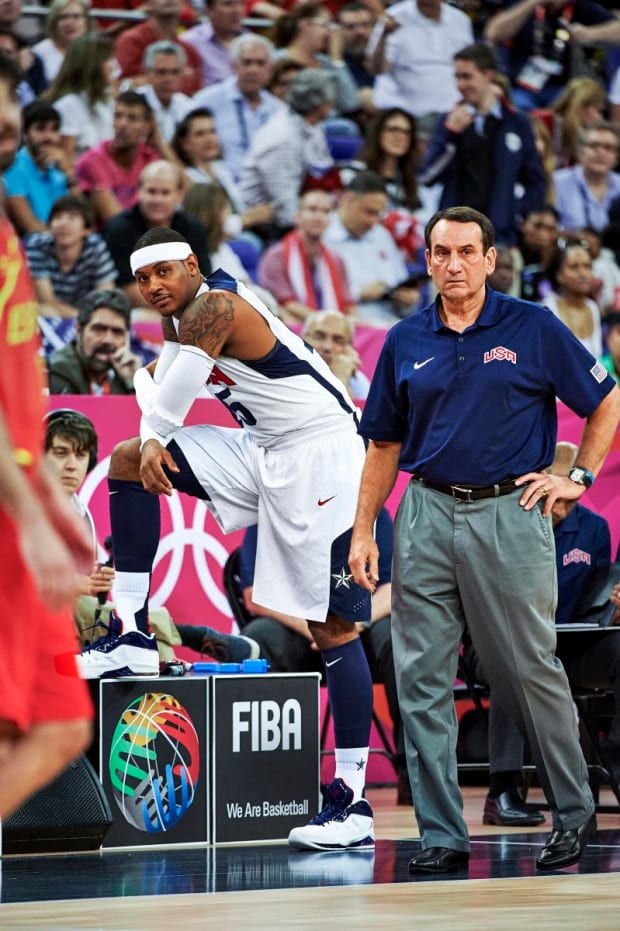
John W. McDonough/Sports Illustrated
“If you lose LeBron, you lose the whole enterprise,” one Team USA staffer remembers thinking. “You can’t have LeBron doing that. They get off the bus and Coach K pulls him aside immediately and says, ‘Look, you have to trust that I’ll never ask you to do something I don’t feel is important. . . . You have to trust that we’re doing this for the right reasons.’ . . . That’s probably the first time LeBron James has been talked to that way.”
But all in all, the Americans arrived for their final Olympic tune-up, against the Aussies, looking like a unified group. Krzyzewski was able to connect with this team, according to one of his bench players, former Duke big man Carlos Boozer, partly because as a college coach he was not carrying any NBA baggage. “He had no alliance with the Bulls or Lakers or Spurs,” Boozer says. “There was no old beef with a player. He didn’t knock you out of the NBA playoffs. He didn’t trade you or cut your best friend.”
McMillan maintains that Krzyzewski was never intimidated by the NBA players because he “was a star in his own right. He had an ego, too.” Still, Krzyzewski knew that he couldn’t berate the pros as he would his Blue Devils on scholarship—not that they gave him much reason to. Boeheim, who joined Krzyzewski on the U.S. staff, says that only one player was ever late for a Coach K practice or meeting: Wade, by five minutes.
“Mike just called him out, and Dwyane said it would never happen again,” Boeheim recalls. “And it never happened again.”
Bryant, for one, enjoyed how Krzyzewski coached him. A lot of players were surprised that Kobe accepted the invitation to play for Team USA, given his standing around the league as a lone wolf. In that first team meeting in Las Vegas, Bryant sat at a table by himself, removed from his teammates, right behind the coaching staff. “It looked kind of weird,” says McMillan.
Over time, Kobe felt reinvigorated by the unique challenge before him. He had been a pro for 10 years and appreciated the fact that Coach K was motivating him in a way that had nothing to do with money. But standards are standards, and suddenly on the night of Aug. 5, 2008, Bryant wasn’t meeting Team USA’s. He took a few loose shots in the second half against Australia—enough to draw the attention of his teammates. The U.S. won 87–76 but looked exceedingly beatable in doing so. The Americans were eager to get on with the Olympic tournament, and Kobe, apparently bored, seemed to be increasing the degree of difficulty on some attempts.
“Everyone knew it,” says one Team USA staffer. “They know when another player is being selfish. Players can police themselves, but in this instance, as LeBron was coming out of the game, he said to Mike, ‘Yo, Coach, you’d better fix that motherf-----,’ as he walks by. He was talking about Kobe.”
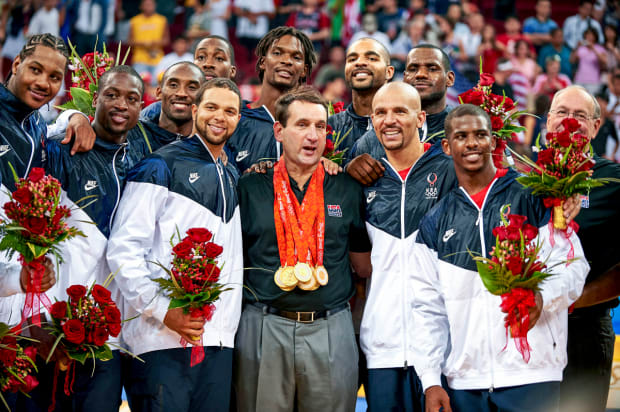
John Biever/Sports Illustrated
The Redeem Team was supposed to be all about accountability, and this was James holding Coach K and Bryant accountable. Krzyzewski told LeBron that he would talk to Kobe and asked that he trust him. The coaching staff met through the night. This time they talked only about how to handle Kobe.
The next morning, before leaving Shanghai, Krzyzewski asked Bryant, a three-time NBA champion with the Lakers, for a private meeting. “Coach was nervous,” says one of his staffers. “He knew he had to do it.”
Coach K pulled out a laptop and sat with Bryant in a room. He showed Kobe a few examples of questionable shots and pointed out his teammates standing around and watching him on some drives to the basket. Krzyzewski told Bryant to his face that these were “bulls--- shots.” Coach K added: “There has to be more movement.” And then he held his breath.
According to a team source, Bryant looked at Krzyzewski and said, “I got it, Coach. I got it. Don’t worry about it. Sorry about that.”
Krzyzewski told James that he’d followed up and confronted Bryant, and that Kobe was back on board with the program. Against the odds, the college coach had reached an accord with the NBA’s biggest stars. “Kobe, LeBron and Coach K all did what they had to do,” says one Team USA staffer. “It made going to Beijing a lot easier.”
The Americans would go on to defeat Spain in a thrilling Olympic final, their first of three gold medal triumphs under the Duke coach. And Mike Krzyzewski, now the winningest coach in NCAA history, would call it the greatest experience of his life.







